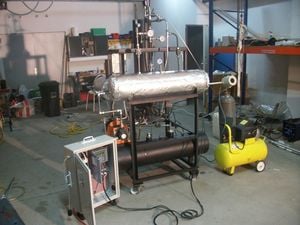
The Icarus project is a multi-disciplinary project working on an absorption power system for highly efficient power generation from low temperature industrial waste heat.
The goal is to create innovative and environmentally friendly CO2/lubricant absorption technology for power generation from low temperature industrial waste heat to reduce emissions and costs.
The main target group for ICARUS technology is in the lime and cement industries who need this technology to improve efficiency and lower emissions in the industry.
Project goals[edit | edit source]
- Create an absorption power generation technology for low temperature (60-120C) heat
- Create a waste-heat power generation system for industrial (chemical, cement) applications that can achieve an efficiency of up to 20% for electricity to be generated from industrial waste heat (<120C) without affecting industrial processes.
- Offer improved environmental performance and improved efficiency
- Reduced CO2 emissions at a cost that is affordable to the end-user.
Design[edit | edit source]
-
Test rig, view 2.
-
Test rig, view 3.
-
Test rig, view 4.
Next steps[edit | edit source]
Further technical issues must be solved, but a 20kW system looks like a viable option.
Conclusions[edit | edit source]
The prototypes have shown that a 20kW system would achieve a payback period of 1 year and 5 months and the GHG emissions cut per year using the 20kW system have been estimated as 88.12 tonnes CO2e in the UK and 124.45 tonnes CO2 in Greece.
Contact details[edit | edit source]
- http://web.archive.org/web/20141220063239/http://www.icaruspower.eu/
- http://www.etdyn.com
- info@etdyn.com


